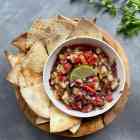Feeding Baby’s Microbiome: How Does Breastfeeding Influence The Gut-Brain Axis?

Here at NeuroTrition we are fascinated by the gut microbiome - the ecosystem of trillions of tiny microorganisms in your gut that can have a powerful effect on your brain’s health. These gut bugs can be altered by diet to shift the microbiome-gut-brain axis, and have the potential to change our mood and mental health.
Microbiota (aka. gut bugs) can be transplanted from a host to a recipient to set up colonies. But we aren’t talking about faecal microbiome transplants (FMTs) here (although I find them pretty fascinating). We’re talking about how mom’s breastmilk shapes her infant’s microbiome! A mother is host to her baby during pregnancy, and she plays a crucial role in shaping the microbiome of her infant. So I wanted to know, how important are these microbial pioneers baby gets from mom in shaping the infant’s future brain health? Let’s explore.
Sowing the seeds of a new microbiome
After birth, millions of bacteria move into baby to set up microbiome colonies in the skin, mouth and gut. These settlers are transported from mom to baby during birth where the baby is exposed to microbes in the birth canal, and from the mother’s skin when they are reunited on the outside.
How a baby is born influences their microbiome, and babies born by vaginal birth vs. caesarean have different microbiota signatures. Those born vaginally have gut bugs similar to mom’s, whereas those delivered by C-section have a bug profile closer to that of the doctor’s and nurses’ hands, and even the delivery room wall (1). Interestingly, research suggests that babies delivered by caesarean are more at risk of suffering from allergies, asthma, gut disorders, obesity, and diabetes (2). But it’s unclear so far whether the super clean surgical environment during a caesarean procedure is the major player in shifting the microbiome and whether this is causal (or at least a contributor) to these health risks.
Next up comes mealtime, and here is where things start getting really exciting for the microbiome!
During the first days of life, baby’s gut microbiota begins to form. Breastmilk is enriched with bacteria, called the maternal microbiota, that set up camp in baby’s gut.
During the first days of life, baby’s gut microbiota begins to form. Breastmilk is enriched with bacteria, called the maternal microbiota, that set up camp in baby’s gut. Breastmilk is also full of key nutrients including human milk oligosaccharides — sugars that act as a prebiotic which provides sustenance for the bacteria (quite literally, prebiotics are food for our probiotics). Basically, these bacteria are all packed and ready to move to their new home… In scientific terms, it is said that the mother’s breastmilk “seeds” the microbiome of her offspring (3).
Is breastmilk the best for baby’s microbiome?
Breastmilk has evolved to provide optimum nutrition for infants. Antibodies and hormones are abundant in the breastmilk cocktail, and are vital for forming baby’s immune system and metabolism, which is why people might say, “breast is best” (but keep in mind this might be overstated) (4). The way a baby is delivered can also alter the composition of mom’s breastmilk microbiome (5), so there are lots of factors at play.
Manufacturers of infant formula milk haven’t been able to recreate the complete spectrum of nutrients that breastmilk provides to the infant, and different compositions of the gut microbiome are seen in formula and breastmilk fed infants (6).
Manufacturers of infant formula milk haven’t been able to recreate the complete spectrum of nutrients that breastmilk provides to the infant, and different compositions of the gut microbiome are seen in formula and breastmilk fed infants (6). Interestingly, there is evidence that babies fed formula have a greater microbiota diversity than breast fed (7). This seems pretty paradoxical as people with brain and mental health conditions tend to have lower diversity, but the formula fed infants were also more likely to develop obesity (which has been associated with lower microbiome diversity in adults). It is important to bear in mind that not all bacteria are created equal. If we compare two different microbiomes, where one person has a lower microbiota diversity but has more “good” bacteria overall vs. a person with a higher microbiota diversity but with more “bad” bacteria overall, who has the healthier microbiome? These are questions still to be answered.
So…back to bugs and babies. Breastmilk is enriched with beneficial types of microbes, including Bifidobacterium longum and the subspecies Bifidobacteria longum infantis. The prebiotic oligosaccharides in breastmilk nourish these bacteria giving them their perfect diet to proliferate! The abundance of Bifidobacteria in babies’ intestines is linked to positive health benefits — they are anti-inflammatory and rapidly establish themselves to crowd out “bad” gut bacteria associated with gut problems like irritable bowel syndrome, and conditions like asthma, allergies, and autoimmune disease (8). These issues are co-morbid (meaning occur together) with brain and mental health conditions, and we don’t know which comes first: these issues or the nervous system ones. But we think the bad gut bugs play a role in both.
Probiotic supplements
Scientists are looking into whether probiotic supplements containing B. longum can increase levels of this beneficial bacteria, which is super important for babies delivered by caesarean section or who have had extensive antibiotic treatments (9). Research is showing probiotics containing B. Infantis may be a key treatment for premature babies that are at high risk of developing the painful condition necrotizing enterocolitis (damage/death to cells and inflammation of the intestines) (8).
When it comes to antibiotics, we know these bug-blasting drugs not only kill off the bacteria that cause dangerous infections, but they also decimate beneficial bacteria including the gut microbiome. Clinicians need to be mindful when prescribing both infants or breastfeeding mothers antibiotics, as the collateral damage to the developing microbiome has been linked to metabolic, immune and developmental disorders (10, 11). Probiotic supplements could help reverse some of the damage to the gut microbiome caused by antibiotics.
Breastfeeding and brain health
Early life is a critical period for brain development and establishing the gut microbiome. This means that during early life both the trajectory of brain and gut microbiome development is at risk of being disrupted — by antibiotics, stress, poor diet, and infection. All of these risks are linked to negative impacts on physical and mental health, potentially leading to more serious brain disorders later in life.
So, how can breastfeeding impact the brain and mental health of your child? Studies have linked breastfeeding to enhanced brain function including improved intelligence (12) and greater educational achievement (13) as adults.
Breastfeeding for more than 6 months has positive benefits on the mental health of children and teenagers, who report less anxiety, stress, and depression (14).
Breastfeeding for more than 6 months has positive benefits on the mental health of children and teenagers, who report less anxiety, stress, and depression (14). Scientists don’t know yet whether microbiome changes in infancy and throughout life are at the core of mental health issues, and there are loads of other factors that can change the gut microbiome’s composition (like diet and lifestyle) — but we know our gut garden is definitely involved. Stress itself, for example, changes the gut microbiome, decreasing Lactobacillus and increasing anxiety-like behaviour (15).
Building your baby’s microbiome, with nutrition
Scientists are still discovering the importance of the microbiome-gut-brain axis in mental health. But they’re pretty certain that breastmilk is the optimal, perfect nourishment for babies.
So yes, we know that breastfeeding is super important. But we also understand that it’s not always easy. And did you know that nutrition can help? Certain foods, called “galactogogues” might have the power to help a breastfeeding mother increase her milk supply. So we created a delicious Two-Layer Raw Chocolate Lactation Brownie recipe that incorporates as many of these ingredients as possible to give lactating ladies a helping (and tasty!) hand.
What if you can’t breastfeed?
As a final but very important note, I would like to acknowledge and hold space for women who simply cannot breastfeed (or can’t breastfeed for as long as they would have liked). It is a frustrating reality for many mothers, and I want women - no matter where they land on the breastfeeding spectrum - to feel good about themselves, and proud that they did the best they could for their baby.
Below are 3 things you CAN do, if you cannot breastfeed:
1. Quality formula
When using formula, you may want to consult with a nutrition practitioner to help determine the highest quality formula for baby. It’s important to look for a formula that meets your baby’s developmental needs AND is also free of allergens and toxins that may impede their development. Like with any other food, I use the good, better, best philosophy with formula, too.
2. Baby probiotics
As science gets a better grasp on how breastmilk influences the microbiome, it is also fuelling the development of probiotic supplements for babies who are formula-fed. You want to look specifically for bifidobacteria species in an infant probiotic formula (and ideally some prebiotics in there, as well).
3. Breastmilk bank
Lastly, a breastmilk bank with donor milk is another option that we support and stand behind at NeuroTrition. This is where women donate milk (that is checked and made sure to be of the highest quality) to other women who can’t produce any or enough milk. You can find breastmilk banks in most cities, and sometimes you can also receive coverage through your healthcare provider.
I personally was only breastfed for a few months as a really serious nipple biting (gumming?) incident turned my mother right off. And I turned out alright (for the most part, anyways). So while we are discussing the implications of breastfeeding on our gut microbiome and brain health, please always keep in mind how multifactorial these things are. If you can’t breastfeed, arm yourself with the knowledge to do what you CAN do (eg. top-notch formula, baby probiotics, and/or breastmilk bank). And don’t ever blame yourself or allow yourself to feel shamed. Because you are an amazing mama!
- References
-
- Dominguez-Bello, M. G., Costello, E. K., Contreras, M., Magris, M., Hidalgo, G., Fierer, N., & Knight, R. (2010). Delivery mode shapes the acquisition and structure of the initial microbiota across multiple body habitats in newborns. Proceedings of the National Academy of Sciences, 107(26), 11971-11975.
- Jakobsson, H. E., Abrahamsson, T. R., Jenmalm, M. C., Harris, K., Quince, C., Jernberg, C., ... & Andersson, A. F. (2014). Decreased gut microbiota diversity, delayed Bacteroidetes colonisation and reduced Th1 responses in infants delivered by caesarean section. Gut, 63(4), 559-566.
- Moossavi, S., Sepehri, S., Robertson, B., Bode, L., Goruk, S., Field, C. J., ... & Turvey, S. E. (2019). Composition and variation of the human milk microbiota are influenced by maternal and early-life factors. Cell host & microbe, 25(2), 324-335.
- Colen, C. G., & Ramey, D. M. (2014). Is breast truly best? Estimating the effects of breastfeeding on long-term child health and wellbeing in the United States using sibling comparisons. Social Science & Medicine, 109, 55-65.
- Hermansson, H., Kumar, H., Collado, M. C., Salminen, S., Isolauri, E., & Rautava, S. (2019). Breast milk microbiota is shaped by mode of delivery and intrapartum antibiotic exposure. Frontiers in nutrition, 6, 4.
- Thum, C., Cookson, A. L., Otter, D. E., McNabb, W. C., Hodgkinson, A. J., Dyer, J., & Roy, N. C. (2012). Can nutritional modulation of maternal intestinal microbiota influence the development of the infant gastrointestinal tract?. The Journal of nutrition, 142(11), 1921-1928.
- Forbes, J. D. et al. (2018). Association of exposure to formula in the hospital and subsequent infant feeding practices with gut microbiota and risk of overweight in the first year of life. JAMA Pediatr, 172(7):e181161.
- Pannaraj, P. S. et al. Association between breast milk bacterial communities and establishment and development of the infant gut microbiome. JAMA Pediatr. 171, 647–654 (2017).
- Meng, D., Zhu, W., Ganguli, K., Shi, H. N., & Walker, W. A. (2016). Anti-inflammatory effects of Bifidobacterium longum subsp infantis secretions on fetal human enterocytes are mediated by TLR-4 receptors. American Journal of Physiology-Gastrointestinal and Liver Physiology, 311(4), G744-G753.
- Korpela, K., Salonen, A., Vepsäläinen, O., Suomalainen, M., Kolmeder, C., Varjosalo, M., ... & de Vos, W. M. (2018). Probiotic supplementation restores normal microbiota composition and function in antibiotic-treated and in caesarean-born infants. Microbiome, 6(1), 182.
- Langdon, A., Crook, N., & Dantas, G. (2016). The effects of antibiotics on the microbiome throughout development and alternative approaches for therapeutic modulation. Genome medicine, 8(1), 39.
- Nogueira, T., David, P. H., & Pothier, J. (2019). Antibiotics as both friends and foes of the human gut microbiome: The microbial community approach. Drug development research, 80(1), 86-97.
- Mortensen, E. L., Michaelsen, K. F., Sanders, S. A., & Reinisch, J. M. (2002). The association between duration of breastfeeding and adult intelligence. Jama, 287(18), 2365-2371.
- 1Victora, C. G., Horta, B. L., De Mola, C. L., Quevedo, L., Pinheiro, R. T., Gigante, D. P., ... & Barros, F. C. (2015). Association between breastfeeding and intelligence, educational attainment, and income at 30 years of age: a prospective birth cohort study from Brazil. The Lancet Global Health, 3(4), e199-e205.
- Oddy, W. H., Kendall, G. E., Li, J., Jacoby, P., Robinson, M., De Klerk, N. H., ... & Stanley, F. J. (2010). The long-term effects of breastfeeding on child and adolescent mental health: a pregnancy cohort study followed for 14 years. The Journal of pediatrics, 156(4), 568-574.
- Bailey, M. T., Dowd, S. E., Galley, J. D., Hufnagle, A. R., Allen, R. G., & Lyte, M. (2011). Exposure to a social stressor alters the structure of the intestinal microbiota: implications for stressor-induced immunomodulation. Brain, behavior, and immunity, 25(3), 397-407.








